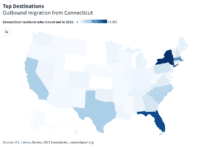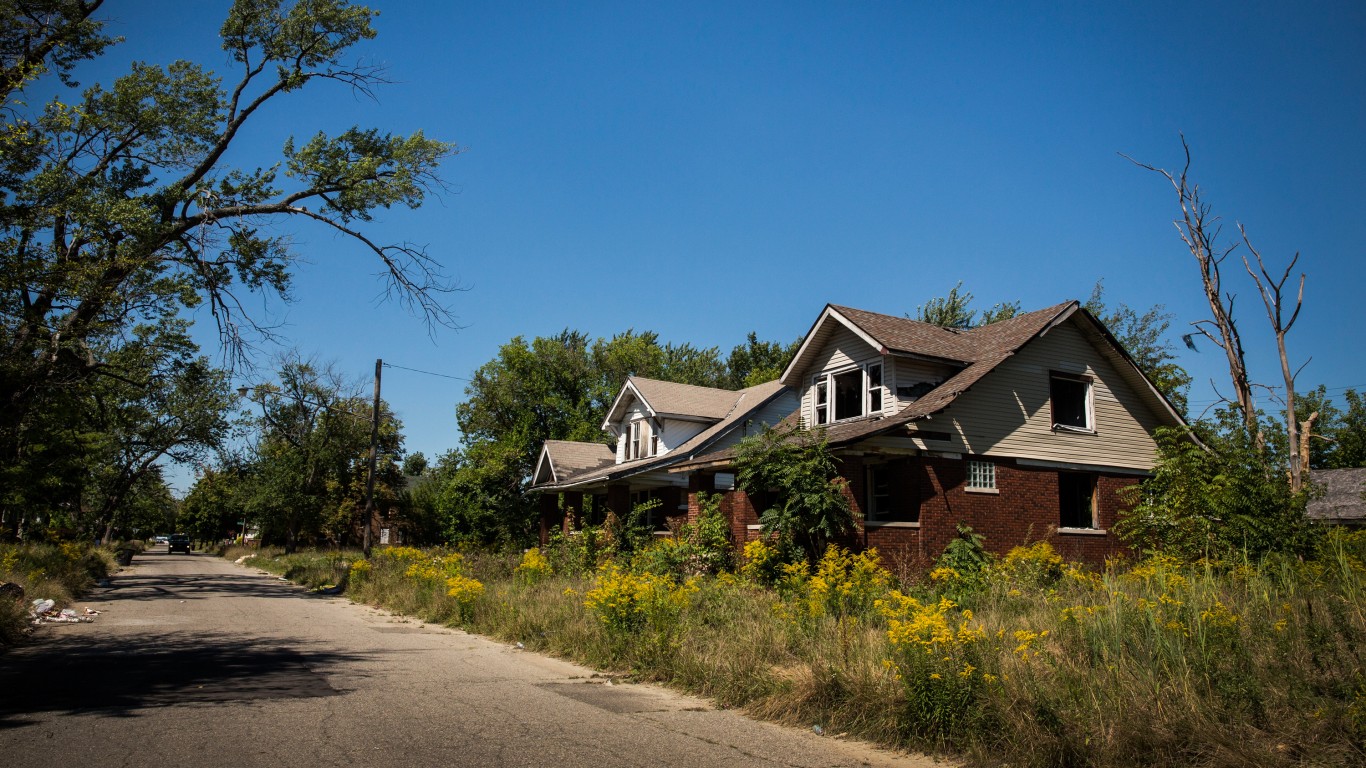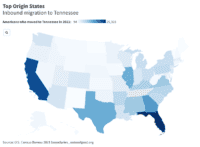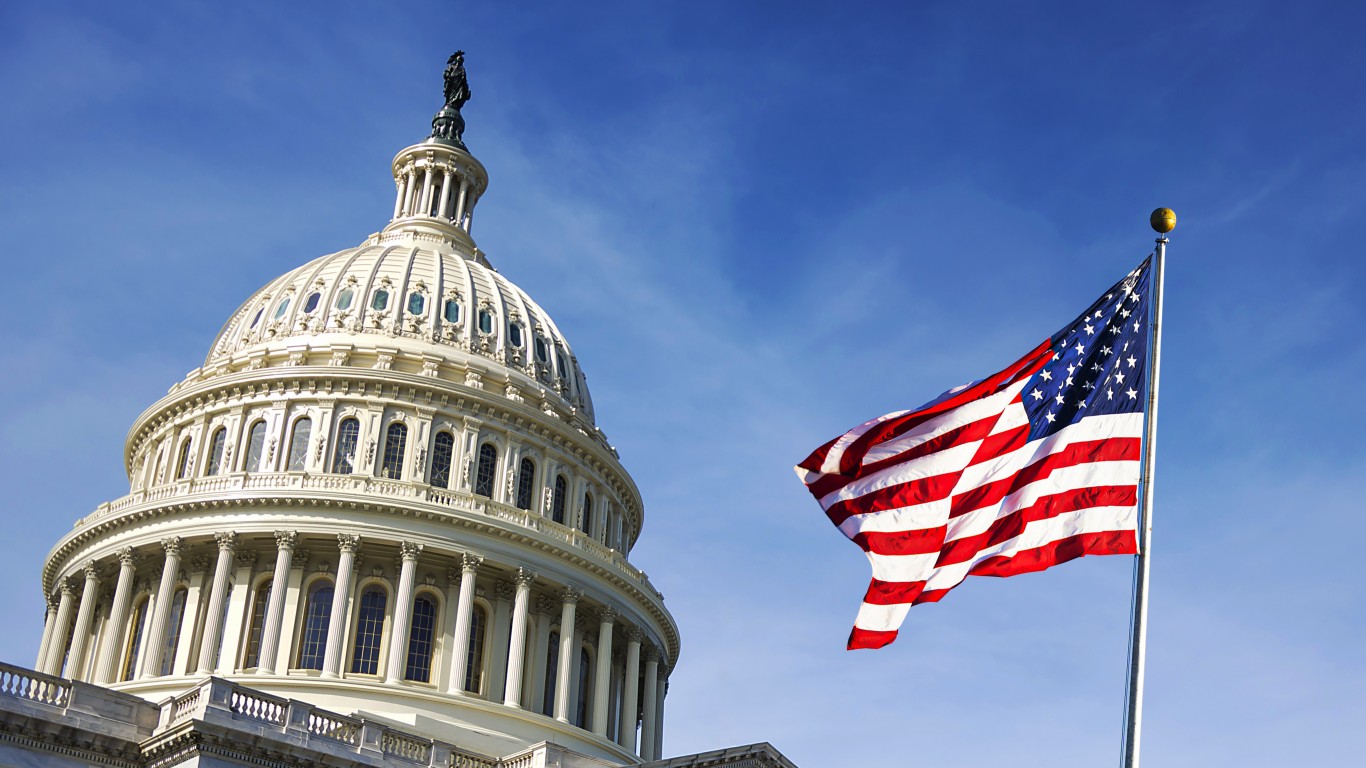
Millions of American households benefited from federal emergency unemployment programs. These programs offered financial support to workers who lost their jobs due to the coronavirus pandemic and its crippling economic impact. Not anymore.
Federal emergency jobless benefits to the unemployed, the long-term unemployed, and the self-employed (including gig workers) ended on Sept. 6 amid a fourth wave of coronavirus cases. Here are the 39 states where people gave up looking for jobs during the pandemic.
Even before the federal government ended the emergency aid, 26 states unilaterally ended supplemental unemployment insurance benefits to cajole Americans back to work. But according to research by economists at Columbia University, Harvard University, the University of Massachusetts Amherst, and the University of Toronto, these states “saw a much larger drop in federal transfers than gains from job creation.”
One issue raised here is the relationship between the states and the federal government. Federal programs like Medicaid and this supplemental pandemic assistance operate under cost-sharing agreements with states. Conservative lawmakers and governors often try to avoid making commitments that could force them to raise state revenue through taxation.
Interestingly, though, blue states are generally less dependent on federal government funds than red states, according to a WalletHub investigation that compared federal assistance states received to federal income tax contributed by states. Many states receive more support from the federal government than they pay in federal income taxes. Some of the least dependent states have among the best economies, and some of the most dependent have among the worst economies. Here are the states with the best and worst economies.
To identify the states that depend the most on the federal government, 24/7 Wall St. reviewed data from WalletHub, which compared states in two dimensions: the state residents’ dependency score and the state government’s dependency score. Other than the state’s overall score, the other scores are relative to other states, with 1 being most dependent and 50 least.
For the state’s residents’ dependency score, WalletHub calculated the return on taxes — federal funding divided by Internal Revenue Service collections — and the share of federal jobs. For the state government’s dependency score, WalletHub calculated federal funding as a share of state revenue for 2018. Population figures are from the U.S. Census Bureau’s American Community Survey for 2019.
Among the 10 least dependent states are New Jersey, Massachusetts, Washington, Utah, and Kansas. Among the 10 most dependent states on the federal government are West Virginia, Kentucky, Louisiana, New Mexico, and Arizona.
Here are the most and least federally dependent states
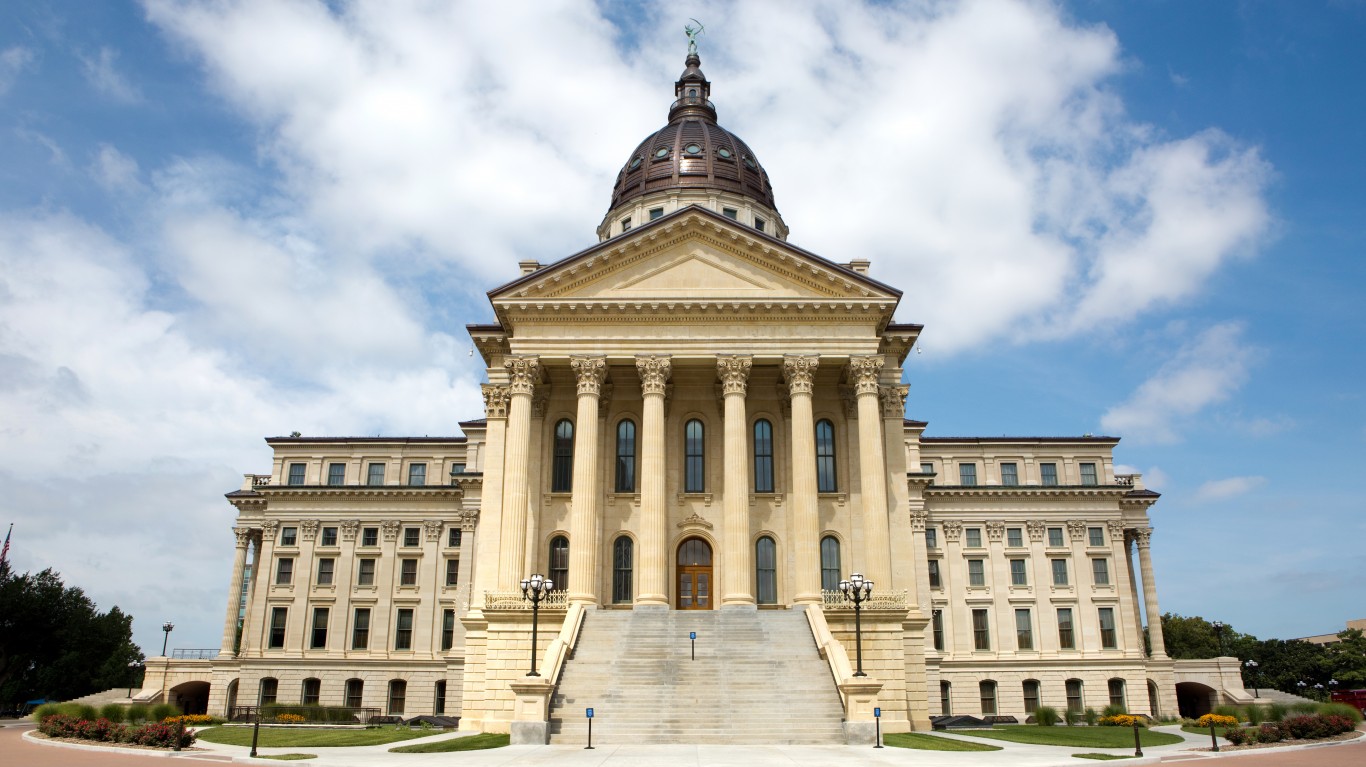
50. Kansas
> Wallethub score: 10.62
> State residents’ dependency score: 39 — 12th lowest
> State government’s dependency score: 49 — 2nd lowest
> 2019 population: 2,913,314
[in-text-ad]

49. New Jersey
> Wallethub score: 13.68
> State residents’ dependency score: 49 — 2nd lowest
> State government’s dependency score: 42 — 9th lowest
> 2019 population: 8,882,190

48. Delaware
> Wallethub score: 15.66
> State residents’ dependency score: 50 — the lowest
> State government’s dependency score: 40 — 11th lowest
> 2019 population: 973,764

47. Utah
> Wallethub score: 19.42
> State residents’ dependency score: 36 — 15th lowest
> State government’s dependency score: 44 — 7th lowest
> 2019 population: 3,205,958
[in-text-ad-2]

46. Iowa
> Wallethub score: 20.53
> State residents’ dependency score: 31 — 20th lowest
> State government’s dependency score: 45 — 6th lowest
> 2019 population: 3,155,070

45. Massachusetts
> Wallethub score: 20.99
> State residents’ dependency score: 47 — 4th lowest
> State government’s dependency score: 38 — 13th lowest
> 2019 population: 6,892,503
[in-text-ad]

44. Washington
> Wallethub score: 21.97
> State residents’ dependency score: 42 — 9th lowest
> State government’s dependency score: 39 — 12th lowest
> 2019 population: 7,614,893
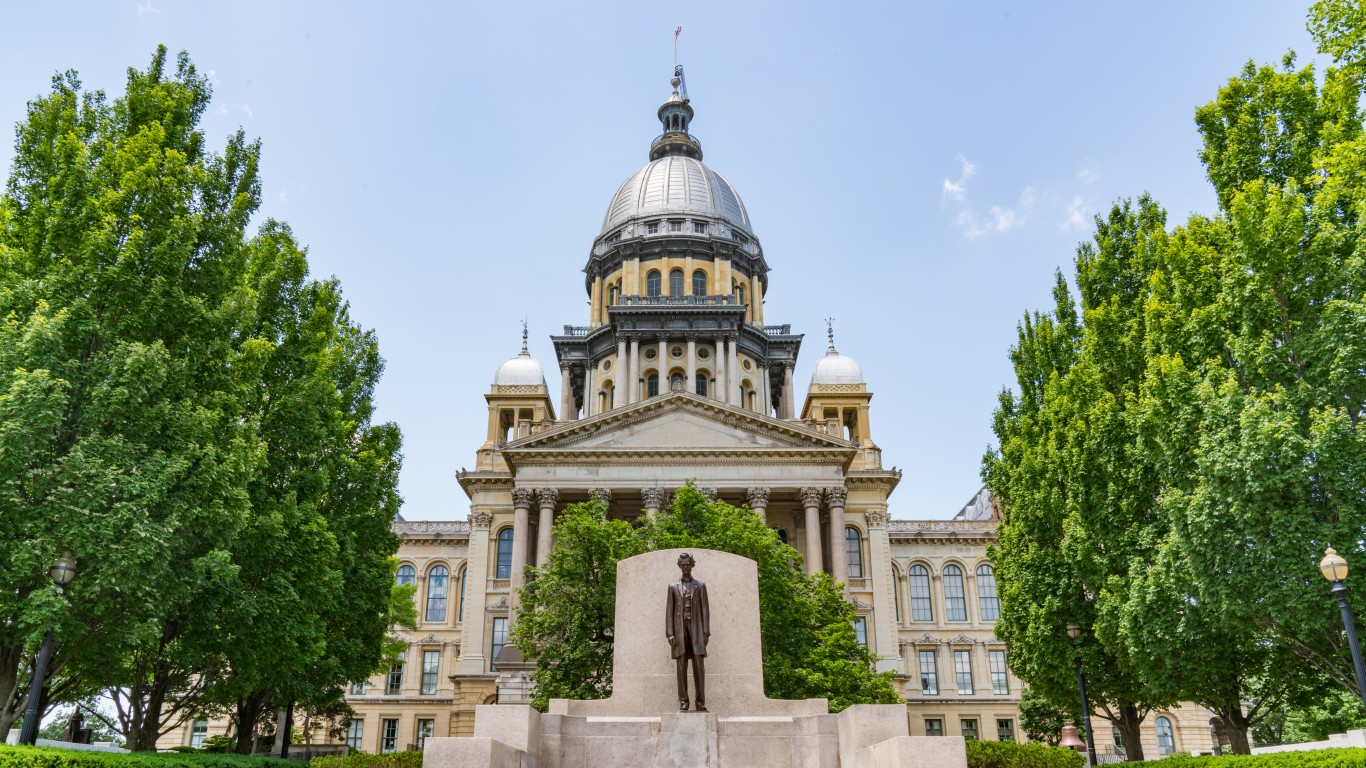
43. Illinois
> Wallethub score: 24.01
> State residents’ dependency score: 48 — 3rd lowest
> State government’s dependency score: 37 — 14th lowest
> 2019 population: 12,671,821

42. Connecticut
> Wallethub score: 25.41
> State residents’ dependency score: 19 — 19th highest
> State government’s dependency score: 46 — 5th lowest
> 2019 population: 3,565,287
[in-text-ad-2]

41. Virginia
> Wallethub score: 25.59
> State residents’ dependency score: 13 — 13th highest
> State government’s dependency score: 50 — the lowest
> 2019 population: 8,535,519

40. Minnesota
> Wallethub score: 25.66
> State residents’ dependency score: 25 — 25th highest
> State government’s dependency score: 41 — 10th lowest
> 2019 population: 5,639,632
[in-text-ad]

39. California
> Wallethub score: 27.93
> State residents’ dependency score: 44 — 7th lowest
> State government’s dependency score: 31 — 20th lowest
> 2019 population: 39,512,223

38. Nebraska
> Wallethub score: 27.93
> State residents’ dependency score: 43 — 8th lowest
> State government’s dependency score: 32 — 19th lowest
> 2019 population: 1,934,408

37. Colorado
> Wallethub score: 28.50
> State residents’ dependency score: 41 — 10th lowest
> State government’s dependency score: 36 — 15th lowest
> 2019 population: 5,758,736
[in-text-ad-2]
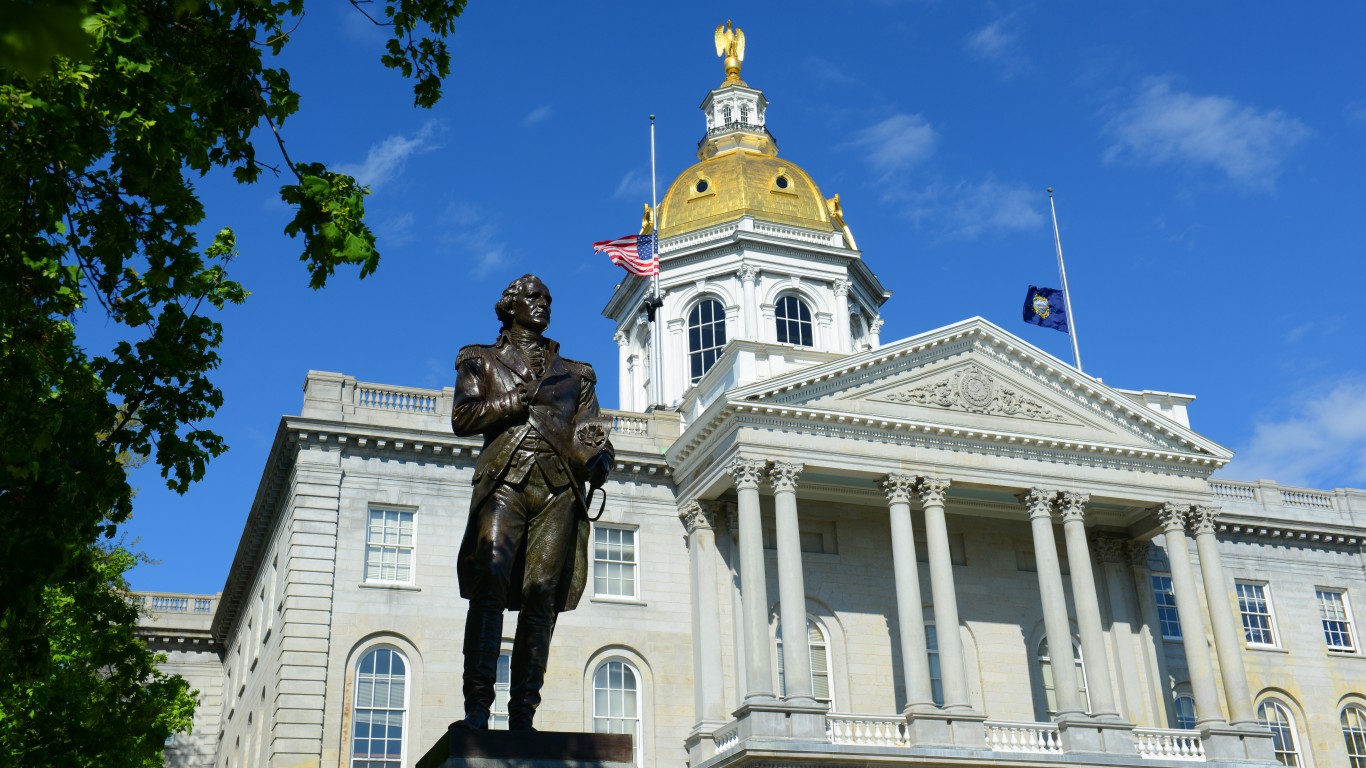
36. New Hampshire
> Wallethub score: 32.03
> State residents’ dependency score: 37 — 14th lowest
> State government’s dependency score: 29 — 22nd lowest
> 2019 population: 1,359,711

35. Texas
> Wallethub score: 32.05
> State residents’ dependency score: 40 — 11th lowest
> State government’s dependency score: 28 — 23rd lowest
> 2019 population: 28,995,881
[in-text-ad]

34. Florida
> Wallethub score: 32.24
> State residents’ dependency score: 30 — 21st lowest
> State government’s dependency score: 34 — 17th lowest
> 2019 population: 21,477,737

33. Hawaii
> Wallethub score: 32.55
> State residents’ dependency score: 9 — 9th highest
> State government’s dependency score: 48 — 3rd lowest
> 2019 population: 1,415,872

32. Ohio
> Wallethub score: 33.96
> State residents’ dependency score: 45 — 6th lowest
> State government’s dependency score: 16 — 16th highest
> 2019 population: 11,689,100
[in-text-ad-2]

31. Nevada
> Wallethub score: 35.23
> State residents’ dependency score: 32 — 19th lowest
> State government’s dependency score: 25 — 25th highest
> 2019 population: 3,080,156

30. North Carolina
> Wallethub score: 35.36
> State residents’ dependency score: 34 — 17th lowest
> State government’s dependency score: 24 — 24th highest
> 2019 population: 10,488,084
[in-text-ad]

29. Rhode Island
> Wallethub score: 35.44
> State residents’ dependency score: 35 — 16th lowest
> State government’s dependency score: 22 — 22nd highest
> 2019 population: 1,059,361

28. Wisconsin
> Wallethub score: 35.92
> State residents’ dependency score: 15 — 15th highest
> State government’s dependency score: 43 — 8th lowest
> 2019 population: 5,822,434

27. Michigan
> Wallethub score: 35.95
> State residents’ dependency score: 28 — 23rd lowest
> State government’s dependency score: 27 — 24th lowest
> 2019 population: 9,986,857
[in-text-ad-2]

26. New York
> Wallethub score: 36.33
> State residents’ dependency score: 46 — 5th lowest
> State government’s dependency score: 14 — 14th highest
> 2019 population: 19,453,561

25. Georgia
> Wallethub score: 37.31
> State residents’ dependency score: 33 — 18th lowest
> State government’s dependency score: 19 — 19th highest
> 2019 population: 10,617,423
[in-text-ad]

24. Oregon
> Wallethub score: 37.38
> State residents’ dependency score: 26 — 25th lowest
> State government’s dependency score: 26 — 25th lowest
> 2019 population: 4,217,737

23. Idaho
> Wallethub score: 37.74
> State residents’ dependency score: 21 — 21st highest
> State government’s dependency score: 33 — 18th lowest
> 2019 population: 1,787,065

22. Oklahoma
> Wallethub score: 39.91
> State residents’ dependency score: 20 — 20th highest
> State government’s dependency score: 30 — 21st lowest
> 2019 population: 3,956,971
[in-text-ad-2]

21. South Dakota
> Wallethub score: 41.07
> State residents’ dependency score: 23 — 23rd highest
> State government’s dependency score: 21 — 21st highest
> 2019 population: 884,659

20. Arkansas
> Wallethub score: 41.56
> State residents’ dependency score: 38 — 13th lowest
> State government’s dependency score: 13 — 13th highest
> 2019 population: 3,017,804
[in-text-ad]

19. Maryland
> Wallethub score: 41.88
> State residents’ dependency score: 16 — 16th highest
> State government’s dependency score: 35 — 16th lowest
> 2019 population: 6,045,680

18. North Dakota
> Wallethub score: 44.17
> State residents’ dependency score: 3 — 3rd highest
> State government’s dependency score: 47 — 4th lowest
> 2019 population: 762,062

17. Vermont
> Wallethub score: 45.13
> State residents’ dependency score: 18 — 18th highest
> State government’s dependency score: 23 — 23rd highest
> 2019 population: 623,989
[in-text-ad-2]

16. Missouri
> Wallethub score: 47.52
> State residents’ dependency score: 29 — 22nd lowest
> State government’s dependency score: 10 — 10th highest
> 2019 population: 6,137,428

15. Pennsylvania
> Wallethub score: 47.80
> State residents’ dependency score: 17 — 17th highest
> State government’s dependency score: 20 — 20th highest
> 2019 population: 12,801,989
[in-text-ad]

14. Tennessee
> Wallethub score: 52.81
> State residents’ dependency score: 22 — 22nd highest
> State government’s dependency score: 9 — 9th highest
> 2019 population: 6,829,174

13. Maine
> Wallethub score: 53.80
> State residents’ dependency score: 12 — 12th highest
> State government’s dependency score: 18 — 18th highest
> 2019 population: 1,344,212

12. Wyoming
> Wallethub score: 58.14
> State residents’ dependency score: 24 — 24th highest
> State government’s dependency score: 5 — 5th highest
> 2019 population: 578,759
[in-text-ad-2]

11. Alabama
> Wallethub score: 59.36
> State residents’ dependency score: 11 — 11th highest
> State government’s dependency score: 15 — 15th highest
> 2019 population: 4,903,185

10. Louisiana
> Wallethub score: 62.45
> State residents’ dependency score: 27 — 24th lowest
> State government’s dependency score: 1 — the highest
> 2019 population: 4,648,794
[in-text-ad]

9. South Carolina
> Wallethub score: 67.36
> State residents’ dependency score: 6 — 6th highest
> State government’s dependency score: 17 — 17th highest
> 2019 population: 5,148,714

8. Indiana
> Wallethub score: 69.96
> State residents’ dependency score: 8 — 8th highest
> State government’s dependency score: 11 — 11th highest
> 2019 population: 6,732,219

7. Arizona
> Wallethub score: 70.33
> State residents’ dependency score: 10 — 10th highest
> State government’s dependency score: 7 — 7th highest
> 2019 population: 7,278,717
[in-text-ad-2]

6. Montana
> Wallethub score: 73.87
> State residents’ dependency score: 14 — 14th highest
> State government’s dependency score: 2 — 2nd highest
> 2019 population: 1,068,778

5. West Virginia
> Wallethub score: 75.36
> State residents’ dependency score: 2 — 2nd highest
> State government’s dependency score: 12 — 12th highest
> 2019 population: 1,792,147
[in-text-ad]

4. Kentucky
> Wallethub score: 80.78
> State residents’ dependency score: 5 — 5th highest
> State government’s dependency score: 8 — 8th highest
> 2019 population: 4,467,673

3. Mississippi
> Wallethub score: 83.94
> State residents’ dependency score: 7 — 7th highest
> State government’s dependency score: 3 — 3rd highest
> 2019 population: 2,976,149

2. Alaska
> Wallethub score: 84.23
> State residents’ dependency score: 4 — 4th highest
> State government’s dependency score: 4 — 4th highest
> 2019 population: 731,545
[in-text-ad-2]

1. New Mexico
> Wallethub score: 86.57
> State residents’ dependency score: 1 — the highest
> State government’s dependency score: 6 — 6th highest
> 2019 population: 2,096,829
Thank you for reading! Have some feedback for us?
Contact the 24/7 Wall St. editorial team.
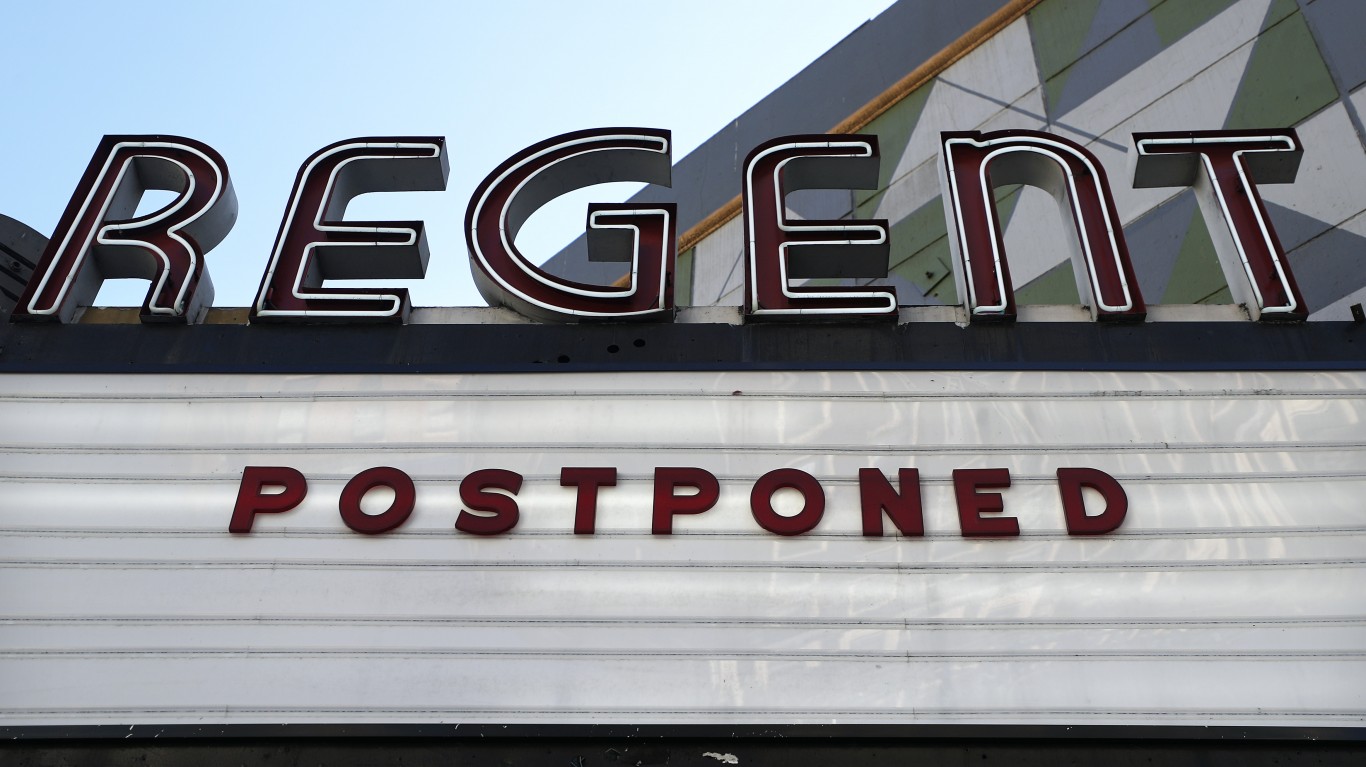 24/7 Wall St.
24/7 Wall St. 24/7 Wall St.
24/7 Wall St.